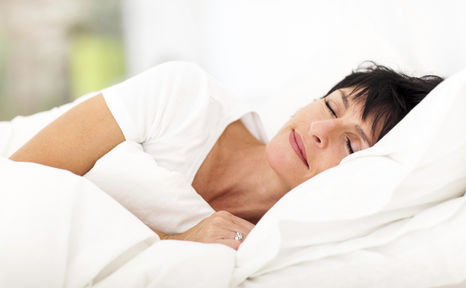

Some people with chronic pain can still exercise; this may be why

If you suffer from chronic pain, the last thing on your mind is getting more exercise. But what if there was a simple way for those with day-to-day chronic pain to be more physically active? What if all you needed to do was catch some quality shuteye — sound too good to be true? Turns out it may not be. Quality sleep may be just the ticket for helping patients with chronic pain get more exercise, according to a new study published in PLOS ONE.
Physical activity has long been prescribed for those with chronic pain. The new study looked at what factors on a day-to-day basis contributed to chronic pain — including the effect of sleep on the amount of physical activity the next day.
An electronic diary and an average activity score monitored 119 chronic pain patients' sleep and physical activity. Patients found it difficult to stay active after the onset of pain, but those who had better quality of sleep were more likely to be more physically active — despite the onset of pain.
“In the absence of interventions, chronic pain patients spontaneously engaged in more physical activity following a better night of sleep. Improving nighttime sleep may well be a novel avenue for promoting daytime physical activity in patients with chronic pain,” the study states.
It may seem impossible at times to want to exercise when you're living with chronic pain Still, many doctors recommend exercise for pain management. Those who exercise have increased mobility, flexibility and are generally healthier overall — all of which are important to people with chronic pain.
Keep a consistent bedtime. Go to bed around the same time each night and get up at approximately the same time every morning, even on weekends.
Unwind before bed. Take a warm bath, read a book or do a puzzle – anything that will help you relax in the evenings.
Make yourself and your environment comfortable. Wear comfortable pajamas, invest in a good mattress and pillows, set the thermostat to a cool temperature, and make sure your room is dark.
Use your bed for sleep only. Don't watch television, work on the computer or play and talk on your phone in bed.
Get out of bed if you don’t fall asleep after 15-20 minutes. Don't torture yourself by staring at the clock. Get up, leave your bedroom, and do something until you feel sleepy.
Be mindful of naps. Daytime sleep can interfere with nighttime sleep. If you need to nap, don't sleep for a long period of time or too close to bedtime.
Avoid caffeine and alcohol in the 4 to 6 hours before bedtime. Caffeine can make it difficult to fall asleep, and alcohol can increase the number of times you wake up overnight.
Limit your liquid intake in the evenings if the need to use the bathroom is waking you up at night. Be sure to go to the bathroom right before you get in bed every night, too.
Get regular exercise if your doctor says it’s OK. If you exercise during the day, you’ll be more likely to be tired when you fall asleep. Just be sure to wrap up your workout at least three hours before bedtime.
To learn more on this topic:
How to Beat Stress-Induced Insomnia
9 Ways To Prevent Arthritis Flare-Ups
An Introduction to Exercising with Arthritis
Copyright © www.orthopaedics.win Bone Health All Rights Reserved